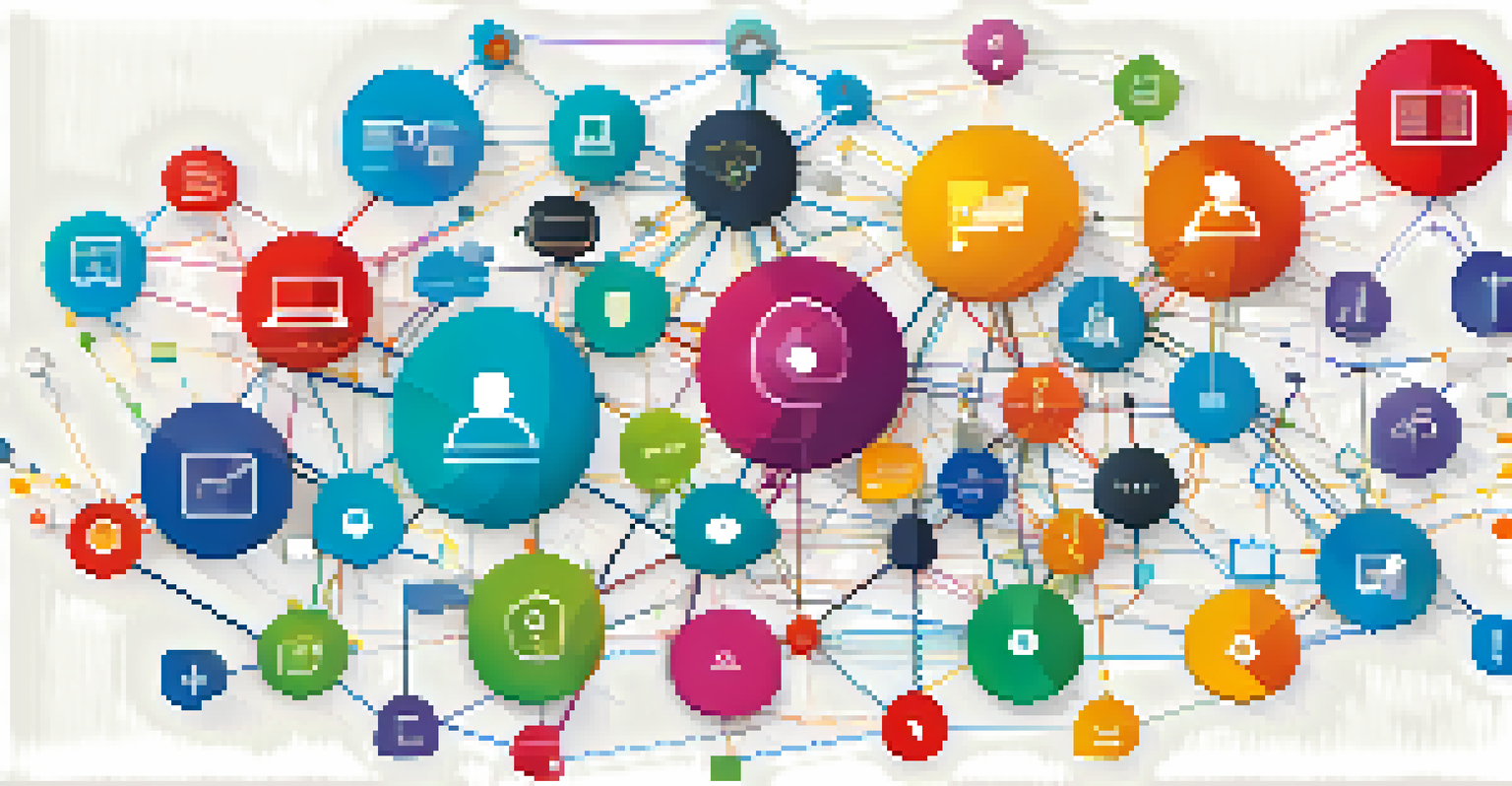The Impact of Knowledge Management on Employee Productivity

Understanding Knowledge Management and Its Importance
Knowledge management (KM) refers to the systematic process of capturing, distributing, and effectively using knowledge within an organization. It plays a crucial role in fostering a culture of continuous learning and collaboration among employees. By harnessing the collective intelligence of the workforce, companies can enhance decision-making and drive innovation.
Knowledge management is not just about technology; it's about the people who use it and the culture that surrounds it.
In today's fast-paced business environment, organizations must adapt quickly to changes. Knowledge management allows businesses to stay ahead of the curve by ensuring that valuable insights and expertise are always accessible. This accessibility not only aids in problem-solving but also boosts overall organizational efficiency.
Ultimately, a robust KM strategy lays the foundation for a knowledgeable workforce, where employees feel empowered to share their insights and learn from one another. This sense of community fosters an environment where productivity can thrive, making it an essential component in any successful organization.
How KM Enhances Employee Collaboration
One of the significant ways knowledge management impacts productivity is by enhancing collaboration among employees. When team members can easily share information and resources, it leads to more effective teamwork and project outcomes. Collaborative tools and platforms facilitate real-time communication, breaking down silos within the organization.

For example, when employees have access to shared databases or knowledge repositories, they can quickly find the information they need without waiting for someone else to respond. This immediacy not only saves time but also encourages a culture of sharing and cooperation, where everyone feels responsible for contributing to the collective knowledge.
KM Boosts Employee Collaboration
Knowledge management enhances teamwork by providing easy access to shared information and resources.
By fostering collaboration through KM, organizations can leverage diverse perspectives and expertise, leading to more innovative solutions. This collaborative spirit ultimately enhances productivity as employees work more efficiently together, achieving their goals faster and with greater satisfaction.
Streamlining Processes Through Effective KM
Knowledge management streamlines processes by standardizing workflows and best practices across the organization. When information and procedures are documented, employees can easily follow established guidelines, reducing the time spent figuring out how to perform tasks. This consistency leads to higher quality outputs and fewer errors.
An organization's ability to learn, and translate that learning into action rapidly, is the ultimate competitive advantage.
For instance, a well-documented set of procedures for onboarding new employees ensures that everyone receives the same information and training. This not only accelerates the onboarding process but also creates a sense of confidence among new hires, enabling them to contribute to the team more quickly.
Furthermore, when employees can refer to past projects and lessons learned, they can avoid repeating mistakes, thereby enhancing productivity. Streamlined processes through effective KM not only save time but also empower employees to focus on more strategic tasks that drive the organization forward.
Empowering Employees with Access to Knowledge
Access to knowledge is a powerful motivator for employees. When team members feel equipped with the information they need to perform their jobs effectively, their confidence and job satisfaction soar. This empowerment leads to increased engagement and a willingness to take initiative.
Imagine an employee working on a complex project who can easily access case studies and best practices from previous similar projects. This not only provides them with valuable insights but also encourages them to apply innovative solutions, knowing they have the support of the organization’s collective knowledge.
Streamlined Processes Improve Efficiency
Effective knowledge management standardizes workflows, reducing errors and saving time for employees.
By prioritizing knowledge accessibility through KM systems, organizations create an environment where employees are more inclined to participate actively in their roles. This sense of empowerment ultimately translates into higher productivity, as motivated employees are more likely to go above and beyond in their work.
Fostering Continuous Learning and Development
A strong knowledge management system fosters a culture of continuous learning and development among employees. As organizations share knowledge and encourage skill enhancement, employees are more likely to pursue professional growth. This ongoing investment in their capabilities translates into improved performance.
For example, when a company offers access to online courses and learning resources, employees can develop new skills relevant to their roles. This not only keeps them engaged but also prepares them to tackle future challenges, ensuring they remain valuable assets to the organization.
By promoting continuous learning through KM, organizations can create a more adaptable workforce. Employees who are encouraged to learn and grow tend to be more productive, as they possess the latest skills and knowledge necessary to excel in their positions.
The Role of Technology in Knowledge Management
Technology plays a pivotal role in facilitating effective knowledge management. With the right tools, organizations can create centralized repositories where employees can easily access and contribute knowledge. These digital platforms enhance collaboration and streamline communication across teams.
For instance, cloud-based solutions enable employees to share documents and resources in real-time, regardless of their location. This flexibility not only enhances productivity but also supports remote work arrangements, which have become increasingly popular in today’s workforce.
Empowering Employees Drives Productivity
Access to knowledge motivates employees, increasing engagement and encouraging them to take initiative in their roles.
Moreover, advanced technologies like artificial intelligence can assist in curating relevant knowledge and automating repetitive tasks. By leveraging technology in KM, organizations can optimize their knowledge-sharing processes, leading to improved employee productivity and satisfaction.
Measuring the Impact of KM on Productivity
Measuring the impact of knowledge management on employee productivity is essential for demonstrating its value. Organizations can track key performance indicators (KPIs) such as project completion rates, time saved in information retrieval, and employee engagement levels. These metrics provide insight into how KM initiatives are influencing productivity.
For example, if a company implements a new KM system and notices a significant decrease in the time employees spend searching for information, it’s clear that the system is enhancing productivity. Regularly evaluating these KPIs also allows organizations to refine their KM strategies and ensure they are meeting their goals.

By quantifying the benefits of KM, organizations can justify investments in knowledge management initiatives and continue to enhance their practices. This ongoing measurement not only helps in assessing productivity improvements but also reinforces the importance of a culture that values knowledge sharing.